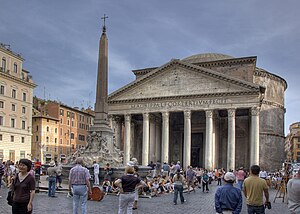Mediterraneanism

Mediterraneanism is an ideology that claims that there are distinctive characteristics that Mediterranean cultures have in common.[1]
History

The Italian anthropologist
Sergi rejected Nordicism's claims of Nordic peoples being strongly Aryan, saying that Aryans were not Nordic in appearance.[2]: 24–27 Instead he claimed that Nordics were "Aryanized Euroafricans", and that the Nordic race is related to Mediterranean race.[2]: 24–27 Sergi responded to typical Nordicist claims of superiority of Nordics over Mediterraneans, by saying that the reason for the perceived lack of wealth or progress in Romance-speaking countries as compared with countries of Northern Europe was because the Aryans of the North, living in frigid climates had developed close-knit groups that allowed them to survive in that environment, as such they became more disciplined, productive civic-minded than southern Europeans.[2]: 24–27 However Sergi rejected claims that Aryans who were a Euroasian people were responsible for founding Greco-Latin civilization. Sergi described the original Aryans in Europe in a negative manner: "The Aryans were savages when they invaded Europe: they destroyed in part the superior civilization of the Neolithic populations, and could not have created the Greco-Latin civilization".[2]: 24–27 Sergi claimed that the only contribution by the ancient Aryans to European civilization was Indo-European languages.[2]: 24–27
Sergi claimed the Nordics had made no substantial contribution to pre-modern civilization, noting that "in the epoch of Tacitus, the Germans ... remained barbarians as in prehistoric times".[2]: 24–27 He claimed that the Romans were unable to Romanize the Germans because the Germans were averse to the Romans' civilizing influence.[2]: 24–27 He rejected Germanic scholars' claims that Germans were the saviors of a decadent post-Roman Italy.[2]: 24–27 Instead Sergi claimed that the Germans were responsible for bringing forward the Dark Ages in the Medieval period and that the Germans of the Medieval period were known for "delinquency, vagabondage, and ferocity".[2]: 24–27
The French historian Fernand Braudel in the 1920s invoked the conception of the Mediterraneanism including claims of Mediterranean universalism to justify French colonialism in Algeria.[4] Braudel had entered his doctrinal studies in the 1920s at the precise time when the issue of Mediterranean unity was being fiercely debated.[4] Braudel supported the pro-unity argument.[4] The argument for Mediterranean unity justified French colonialism in Algeria and viewed the Berbers in a place of privilege amongst the peoples of Africa, as retainers of the lost Roman legacy in Africa.[4] It was claimed that if the Berbers could be culturally separated from the Arabo-Islamic surrounding culture, that the Berbers would become natural allies of the French through their Mediterranean heritage that would challenge anti-colonial sentiment.[4]
Italian Fascist conception

At first, Italian Fascism promoted a variant of Mediterraneanism that, like Sergi's strain of Mediterraneanism, held that Mediterranean people and cultures shared a common historical and cultural bond. Initially, this variant mostly avoided explicit racial connotations; its followers often rejected biological racism and instead stressed the importance of the cultural aspects rather than the racial aspects of the Mediterranean peoples. Implicitly, however, this form of Mediterraneanism posited the
In a 1921 speech in
In 1929, Mussolini asserted that Jewish culture was Mediterranean and that Jews were native to Italy, after living there for a long time. He also praised their contributions to Italy despite their minority status.[8][9]
Italian Fascism strongly rejected the
Nazi German influence and “Nordicist” Mediterraneanism
From the late 1930s through
In 1938, mere months before creating the
With the rise in influence of pro-Nordicist
In 1941, the PNF's Mediterraneanists, through the influence of
See also
References
- ISBN 978-0-19-926545-9.)
{{cite book}}: CS1 maint: date and year (link - ^ a b c d e f g h i j k l m n o p q r s t u v w x y z aa ab Aaron Gillette (2003). Racial Theories in Fascist Italy. Routledge.
- ^ The Journal of the Royal Anthropological Institute of Great Britain and Ireland, Vol. 54. (Jan. – Jun., 1924), p. 30.
- ^ a b c d e Paul A. Silverstein. Algeria in France: Transpolitics, Race, and Nation. P. 66.
- ^ ISBN 978-9004212558. Retrieved 9 January 2016.
- ^ a b Neocleous, Mark. Fascism. Minneapolis, Minnesota, USA: University of Minnesota Press, 1997. p. 36
- ^ Glenda Sluga. The Problem of Trieste and the Italo-Yugoslav Border: Difference, Identity, and Sovereignty in Twentieth-Century. SUNY Press, 2001. P. 52.
- ISBN 978-9004212558. Retrieved 9 January 2016.
- ^ Neocleous, Mark. Fascism. Minneapolis, Minnesota, USA: University of Minnesota Press, 1997. p. 35
- ISBN 978-1-4325-9942-3.
- ^ Gerald R. Gems. Sport and the Shaping of Italian American Identity. Syracuse University Press, 2013. P57.
- ^ Aristotle A. Kallis. Fascist Ideology: Expansionism in Italy and Germany 1922–1945. London, England, UK; New York, New York, USA: Routledge, 2000. P. 45.
- ^ Stanislao G. Pugliese. Fascism, Anti-Fascism, and the Resistance in Italy: 1919 To the Present. Rowman & Littlefield, 2004. P. 195.
Further reading
- Talks with Mussolini, Emil Ludwig, Boston: Little, Brown. 1933, p. 202.
- The Aryan Myth, Leon Poliakov, New York: Basic Books. 1974
- Spiro, Jonathan P. (2009). Defending the Master Race: Conservation, Eugenics, and the Legacy of Madison Grant. Univ. of Vermont Press. ISBN 978-1-58465-715-6.
